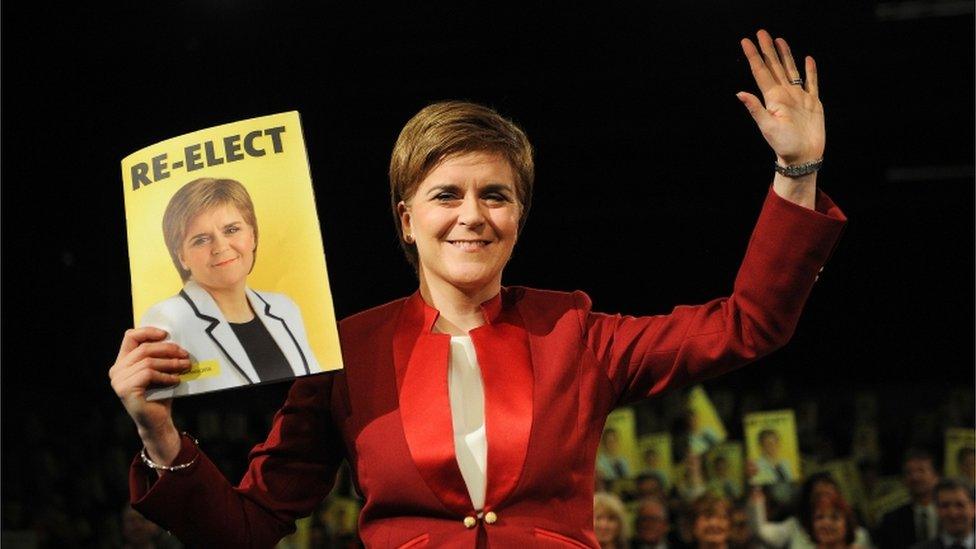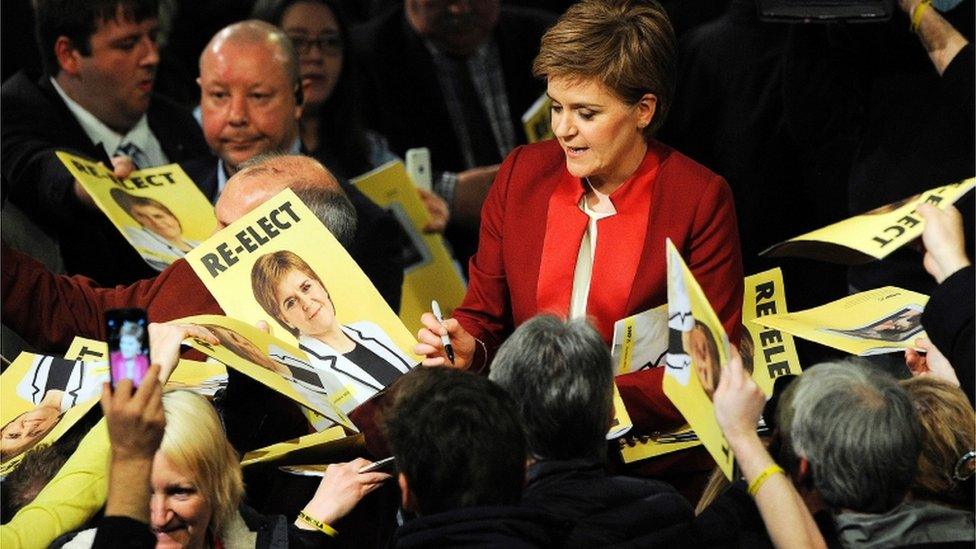SNP manifesto launch: Whooping, hollering and personal appeals
- Published

They whooped, they yelled, they hollered. There was even, at one point, a solitary but distinct "Yee Ha", issuing from the ranks of the invited audience.
Despite the noises off, this was no country hoedown. (Are there still hoedowns? Were there ever? I plead honest ignorance: please don't write in). Nor yet a rock concert. Nor yet again a revivalist rally.
No, this was the launch of the SNP manifesto for the Holyrood elections. A blend of serious content and cheerful determination.
Nicola Sturgeon knows the buttons to push to get applause. Trident, its removal. Land ownership, its reform. And, above all, independence.
At its merest mention, they applauded wildly. One guy with decidedly natty yellow shoes looked as if he had just got six numbers in the Lottery.
And what, exactly, did she say about independence? Well, she said she was all for it. She said she would love to hold a second referendum, if possible. This accompanied by a cheeky grin.
But, in terms of policy, the manifesto does not pledge such a referendum. Rather, it says such a plebiscite would be decidedly conditional. And Ms Sturgeon made that clear, while spelling out the conditions.
These would be either that Scotland was removed from the European Union without the consent of her people. Or that there was demonstrable and sustained support for the notion of independence.

Consider too that there is no automatic trigger here. Not even from the EU referendum. As noted here before, it would be a judgement call (by Ms Sturgeon and colleagues) - based upon the evident judgement of the people.
In short, she wouldn't call a further referendum until she was sure of winning. So the message for the fans at the gig features independence - although, even then, not all that heavily.
The message for the voters in the country focuses, entirely understandably, upon devolved powers: those already here and those coming.
Abstruse allusions
For Ms Sturgeon, this was a notably personal launch. If there was any doubt, it was dispelled by the huge sign over the auditorium reading "Re-elect". (Her speech made clear this meant her, not just her administration).
Subtle it was not - but then elections are not the occasion to test-run obscure and abstruse allusions.
She is seeking a mandate in her own right, having inherited one from Alex Salmond. She is stressing that the "central mission" of her next administration, if returned, would be enhanced education, particularly for those from less privileged backgrounds. Like, she said, Sturgeon, S.
She is promising real terms increases in NHS spending; a fairer approach to social security, under new powers; doubled free childcare; £20bn for infrastructure to boost the economy; and protection for police budgets.
Above all, she is stressing this is about power, not protest. The power to affect change. Other parties, she suggests, may be concerned about who comes second, who jostles for relative advantage. She is interested in winning.
Serious clout
It is an obvious attempt to sharpen the focus in the election in this final fortnight of a long, worthy campaign. To remind folk that Holyrood is about to get serious clout, that this is about choices on tax, choices on spending. It is about government.
In this latter phase, of course, we are back to the beginning. To the fundamental distinction between the SNP and its rivals on tax. The SNP plans to leave the standard rate alone, to scrap an intended cut for higher rate tax powers and to oppose an increase in the very top rate, paid by the wealthiest.
Ms Sturgeon has previously argued that the cut for higher earners, introduced by the Chancellor, is wrong. She has said that cutting the top rate might raise nothing, in the event of effective avoidance.
Today she went a little further on the standard rate, characterising her policy as a freeze, comparable therefore to the nine-year hold on council tax.
She accused the UK Conservatives of pursuing austerity as a matter of policy, arguing further they should be challenged on that at source, that is in Westminster: and that it would be wrong to expect low-paid families in Scotland to "write the cheque" to cover austerity.
It is, to be clear, the basic argument she has pursued from the outset. But it is perhaps nuanced slightly, rephrased slightly: plainly aiming to address potential challenges from rivals.
Onwards to the election itself.
PS: And finally sport. For fairly obvious reasons, I have been sparing in my remarks of late about the once mighty United.
But perhaps you will forgive me a tiny comment on the Cup semi-final. The minute I heard Hibs were fielding an emergency replacement goalkeeper, my heart sank.
Apparently, his last competitive match had been around 1972. That had been a scratch game of shootie-in against the wall of the Weasel and Snowflake public house in Bootle.
When I learned that much, I knew - I just knew - that he would play against United like Lev Yashin. (Younger readers: look him up). So it proved.
Onwards and upwards, though. (One does not yet contemplate downwards). I still say: come away United! And will continue to do so.